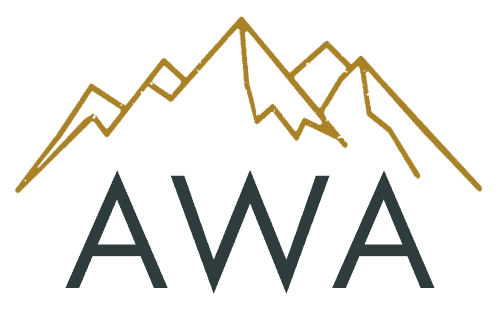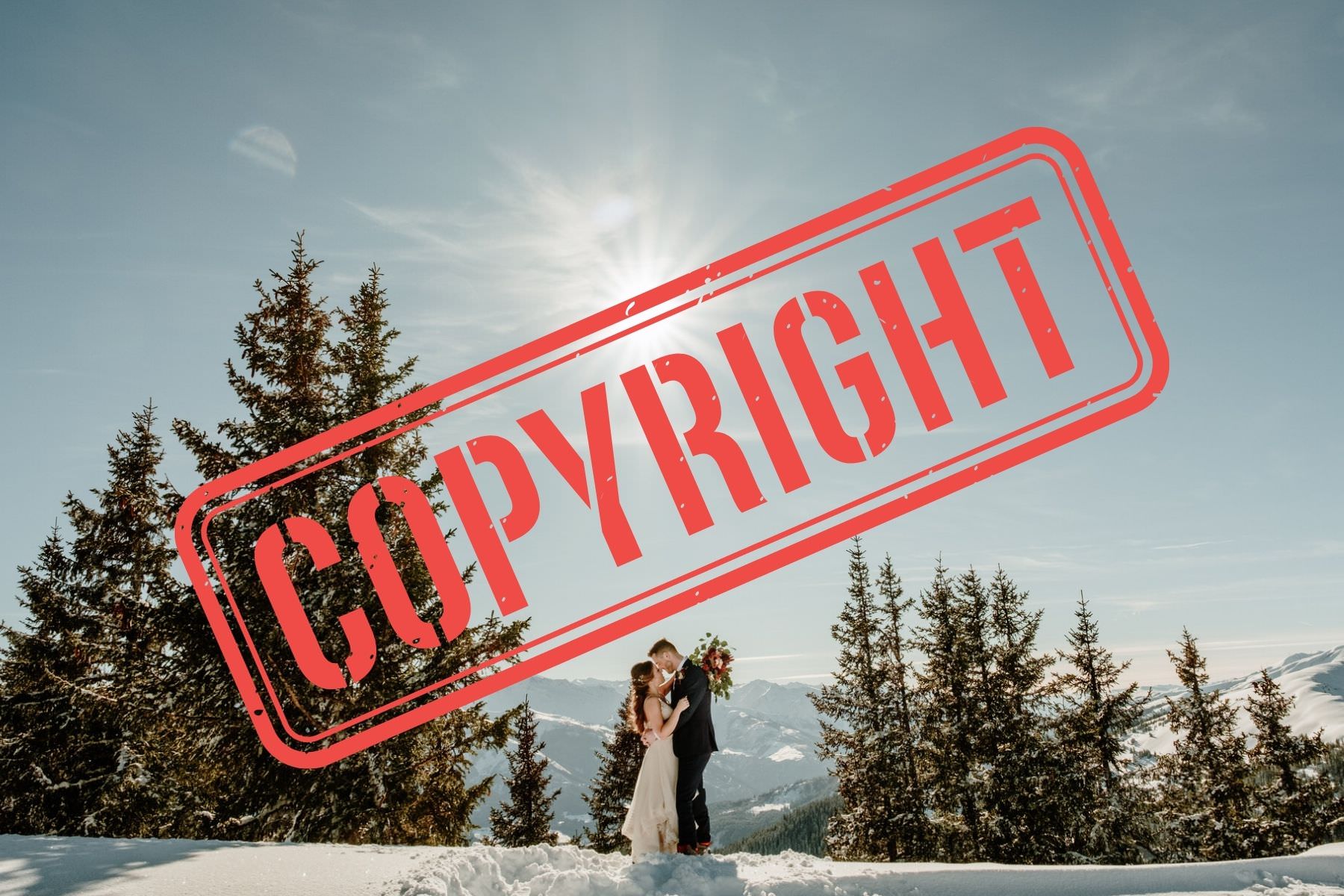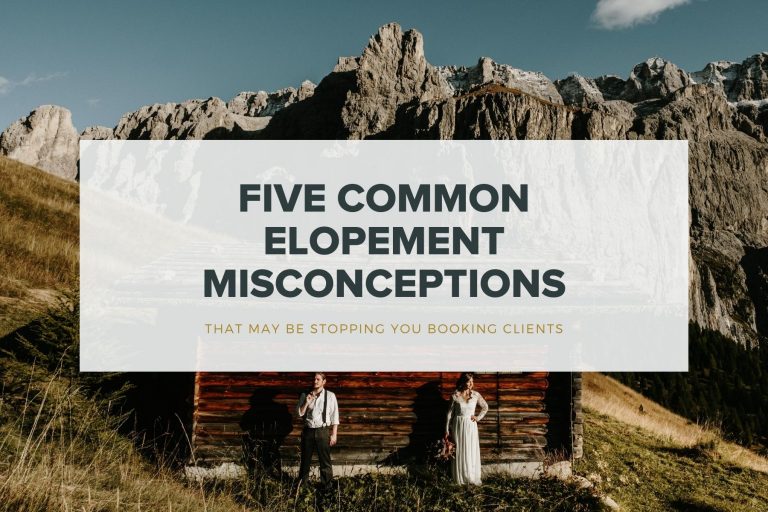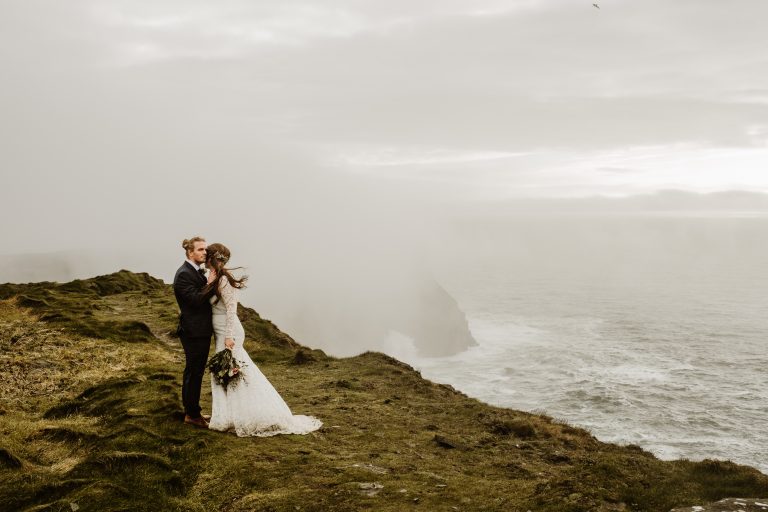Protecting Your Work: Claim Compensation for Image Theft with CopyTrack
Sharing your work online is part of marketing yourself as a wedding photographer. From your own website and social media to being featured in photography contests, magazines and online publications, and directory listings, it’s likely your work is featured in many places across the internet.
But what happens when your work is being used without your permission? In this post, we’ll explore the realities of image theft in the wedding photography industry, discuss your rights as a photographer, and highlight how CopyTrack can help you take action against image theft effectively. Don’t let someone else profit from your creativity—read on to learn how to safeguard your images and reclaim your earnings!
Understanding Image Theft
Definition of Image Theft and Copyright Infringement
Image theft occurs when someone uses a photographer’s work without permission, violating the photographer’s rights. This unauthorized use is often categorized as copyright infringement, which means that the user has not obtained the necessary licenses or permissions to reproduce, distribute, or display the copyrighted work. Copyright laws protect original works of authorship, including photographs, granting creators exclusive rights to control how their images are used. When these rights are ignored, it not only undermines the photographer’s livelihood but also sets a troubling precedent for the value of creative work.
Unauthorized use of images encompasses a wide range of actions, from casual sharing on social media without credit to commercial exploitation in advertisements or websites. In many cases, individuals or businesses may believe that simply attributing the image to the photographer exempts them from seeking permission. However, even with credit, using someone else’s work without explicit consent is still a violation of copyright. The rapid pace of digital sharing complicates matters further, making it all too easy for images to be copied and disseminated widely, often with little regard for the original creator’s rights.
Legal Rights of Photographers
Alright, let’s talk about something super important—your legal rights as a photographer! When you take a photo, you automatically own the copyright to that image. This means you have exclusive rights to control how it’s used, whether that’s sharing it, selling prints, or licensing it to others.
Now, here’s the kicker: even if someone shares your photo online or gives you credit, it doesn’t mean they have the right to use it without your permission. It’s essential to know that copyright infringement can happen unintentionally, but it doesn’t make it any less of a violation. So, protecting your work starts with understanding these rights.
What About Weddings? Don’t The Clients Have The Copyright?
Copyright always belongs to the creator of the images, unless it is sold. When client’s commission you to take wedding photos for them, you still own the copyright. As part of the contract, clients are usually given a license to use the images for personal use. This usually covers printing and sharing personally but does not give them the right to redistribute them to other businesses or sell them for personal gain.
Even if clients ask for “non-disclosure” (not sharing images), you still own the copyright.
If you’re unsure about contracts and what should be in there, check out these posts:
➡️ What should be in a wedding photography contract?
➡️ Does your contract cover adventure weddings?
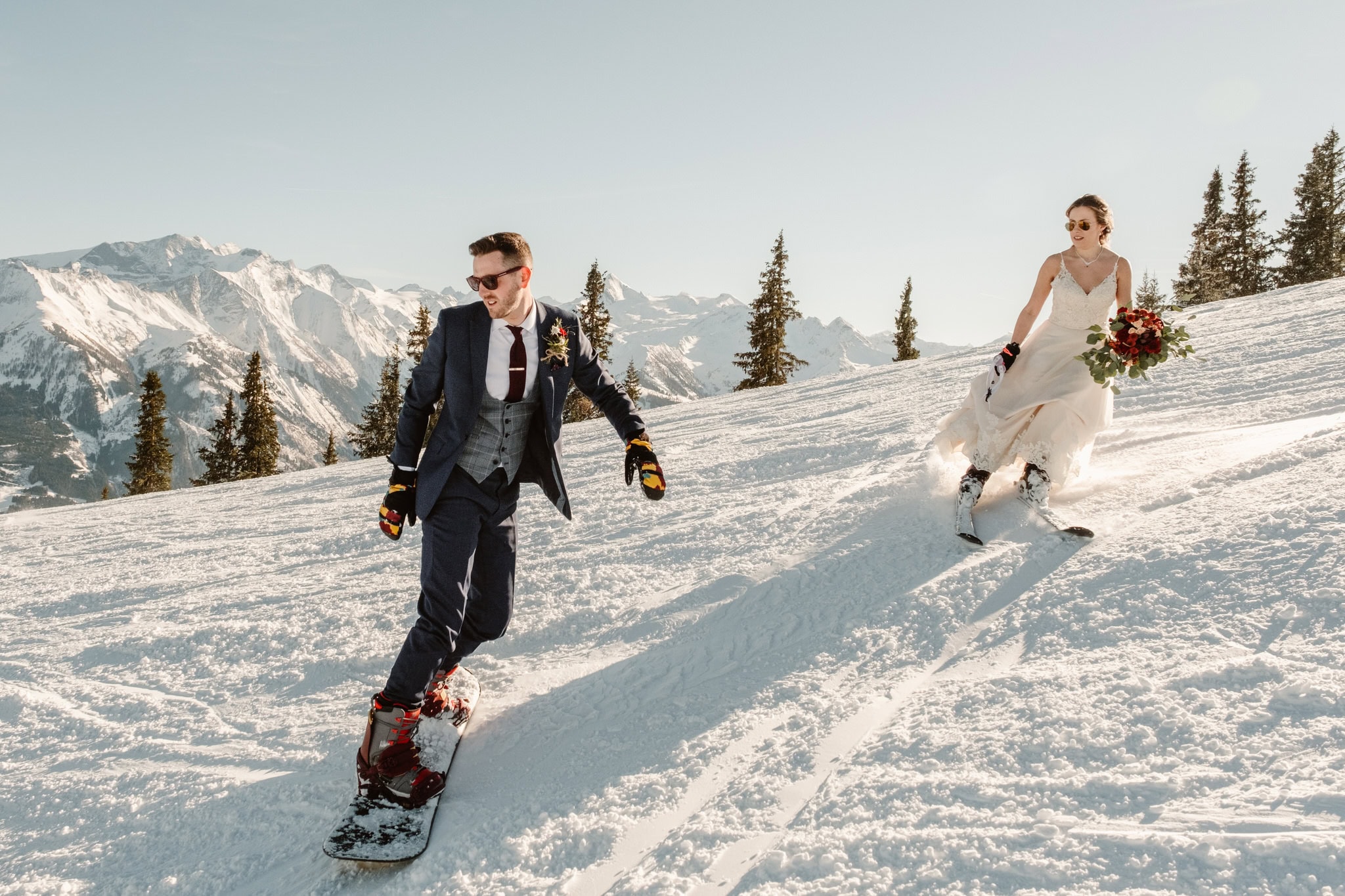
Common Scenarios of Image Theft in the Wedding Industry
Let’s dive into some common scenarios where image theft rears its ugly head, especially in the wedding photography world. You might (or might not) be surprised by how often this happens!
- Social Media Misuse: You know those happy couples who post their wedding photos on Instagram? It’s all good until they forget to tag or credit you as the photographer. Suddenly, the venue is re-sharing it and now your hard work is out there in the world, being liked and shared without your name attached! It’s frustrating because you want your work to be seen, but you also want to be acknowledged for your creativity.
- Vendor Exploitation: Picture this: a florist or a wedding venue thinks your photos are stunning and decides to use them in their marketing materials without asking. They’re using your work to promote their business, but what about you? You might miss out on exposure and potential clients that way. Plus, it’s just not fair to use someone else’s creativity without compensation!
- Commercial Use: This is a big one. Some businesses might stumble upon your wedding photos online and think, “Wow, these are perfect for our advertisement!” They grab your images and use them without your consent, assuming that because they’re out there, they’re free to use. This can hit hard, especially if you’ve poured your heart into capturing those moments.
These examples show how important it is to stay vigilant and proactive about protecting your work. Knowing what could happen helps you put measures in place to prevent unauthorized use.
Preventing Image Theft
So, how can you keep your work safe from those pesky image thieves? Let’s chat about some practical steps you can take to protect your photography!
- Watermark Your Photos: This is one of the simplest and most effective ways to deter theft. By adding a tasteful watermark to your images, you make it clear who the creator is, and it’s harder for others to use your photos without proper credit (unless they intentionally crop your watermark out). However, many photographers (myself included) don’t like to watermark because it can make images look cheap and amateur. So what other options do you have?
- Use Metadata and Copyright Notices: Embed copyright information and your contact details into the filenames and metadata of your images. This means that even if someone downloads your photo, your ownership information is still attached. It’s a little behind-the-scenes protection that can go a long way!
➡️ Read more about image naming in this post - Set Clear Licensing Agreements: When you work with clients, be upfront about how they can use the images you create. Lay out the terms in a contract, specifying what’s allowed and what’s not. This way, you’re setting expectations from the start, and it can help avoid misunderstandings down the line. The same goes for sharing images with vendors. If you are allowing vendors to use images for their marketing, give them clear usage terms, and be clear that a breach of these terms may mean they will be charged.
- Educate Your Clients and Vendors: Sometimes, people just don’t know the rules around using images. Take a moment to explain the importance of respecting copyright to your clients and vendors. A little education can go a long way in preventing unauthorized use!
By implementing these strategies, you can help protect your beautiful work and maintain control over how it’s shared and used.
What to Do If Your Images Are Stolen
Now, let’s say the worst happens, and you discover that someone has stolen your images. It can feel overwhelming, but don’t panic! There are steps you can take to address the situation.
- Document the Infringement: The first thing you should do is gather evidence. Take screenshots of where your images are being used without permission, along with any relevant URLs. Having a clear record will help you if you need to take further action.
- Reach Out to the Offender: Sometimes, people might not realize they’re infringing on your rights. A polite message asking them to remove the images or credit you can work wonders. If they respond positively, great! You’ve resolved the issue without any fuss.
- Send a Cease and Desist Letter: If the offender refuses to take down your images, it might be time to get serious. A cease and desist letter is a formal way to demand that they stop using your work. You can find templates online, or if it feels too daunting, consider consulting with a lawyer to draft one for you.
- Consider Legal Action: If things escalate and you’re facing significant losses due to the theft, legal action might be necessary. This is where services like CopyTrack come in handy. They can help you track down unauthorized uses of your images and assist you in claiming compensation.
Let CopyTrack Search For Stolen Images on Your Behalf
If, like me, you’re too busy to go searching across the internet for stolen images, then you should try CopyTrack. CopyTrack is a free service that allows you to upload up to 500 of your most popular images, and it scours the internet for matches.
If they find a match for your images, you’ll be invited to review the case, and if you confirm it’s your work and it’s being used illegally, they will pursue the case on your behalf. That means no legal fees, no back-and-forth emails. They handle the claim for you, and where it’s successful, you receive 55% of the money.
CopyTrack is a no-win, no-fee service, which means as a photographer, there is zero risk to you signing up and giving it a try.
Last month, I got a €400 paycheck from a successful copyright infringement case, and have 3 more outstanding cases still being pursued.
If you sign up for CopyTrack using my personal invite link, you’ll get 1000 free uploads instead of the standard 500.
Sign Up Link: https://app.copytrack.com/register?rc=60102
Referral Code: 60102
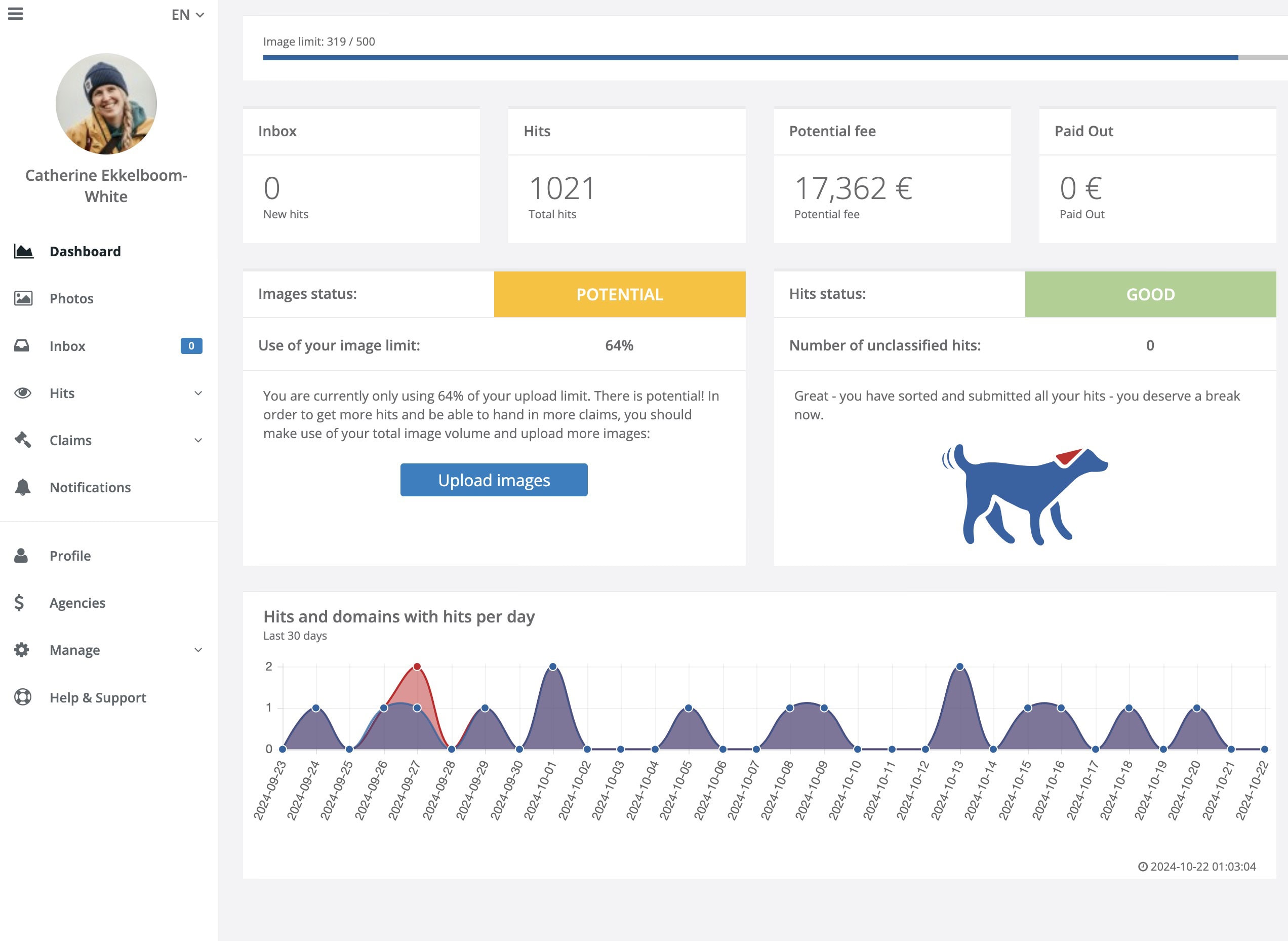
Why Use CopyTrack Over Handling It Yourself?
So, you’ve discovered that your wedding photos have been used without permission. Now what? While you could try to handle the situation yourself, using a service like CopyTrack can save you a lot of time, stress, and possibly money in the long run. Here’s why:
1. Expertise in Image Tracking and Compensation Claims
Let’s be real—tracking down where your images have been used online can feel like trying to find a needle in a haystack. You might spend hours searching for infringements, only to miss key instances or not know what to do next. CopyTrack, on the other hand, is built for this exact task. They use advanced technology to scan the internet for unauthorized uses of your images, catching things that you might never even realize are out there. Plus, once they find infringements, they know exactly how to handle the compensation process. Instead of spending your valuable time navigating legal waters, CopyTrack does the heavy lifting for you.
2. No Upfront Costs
One of the biggest perks of using CopyTrack is that there are no upfront fees. That’s right—there’s no cost to get started. Instead of paying out of pocket for legal advice, drafting cease and desist letters, or filing lawsuits, CopyTrack operates on a commission basis. They only take a percentage if you win a claim and receive compensation. So, essentially, you’re not risking your own money. It’s a no-brainer for photographers who want protection but don’t want to invest in legal processes on their own.
3. Legal Support Without the Hassle
Legal battles can be a nightmare. Think about the time, energy, and expense involved in filing lawsuits, especially across borders if someone overseas is using your work. CopyTrack takes care of the entire legal process for you, from the first cease and desist letter to full-on legal action if necessary. They have legal experts who understand copyright law inside and out, and they handle the paperwork, negotiations, and settlements. So, instead of getting bogged down in legal jargon, you can focus on what you do best—taking amazing wedding photos!
4. A Global Reach
The internet doesn’t care about borders, but unfortunately, international copyright laws do. This can make it incredibly complicated to pursue an infringement case in another country. With CopyTrack’s global reach, you don’t have to worry about this. They operate internationally and can pursue claims regardless of where the infringement has taken place. Whether your photos are being used by a local vendor or on a website halfway around the world, CopyTrack has the connections and resources to handle it.
5. Focus on Your Creativity, Not the Admin
Let’s face it: as a wedding photographer, your time is better spent behind the camera than dealing with admin headaches. Image theft cases can drag on for months, requiring follow-up after follow-up. By using CopyTrack, you hand off all that tedious work to a team that specializes in it. You can stay focused on building your business, working with clients, and capturing those unforgettable moments—while they handle the messy side of things.
6. Higher Chances of Success
While it’s possible to pursue compensation on your own, your chances of success are generally higher with CopyTrack. They have a proven track record and know the exact steps to take in a legal process. With their expertise, technology, and global network, they can often get results faster and more efficiently than a solo photographer trying to figure it out along the way. It’s a bit like having a specialized legal team at your disposal—without the full-time costs.
In short, CopyTrack takes the hassle and complexity out of tracking and claiming compensation for stolen images. Instead of spending your time chasing down infringers, you can trust CopyTrack to do it for you, while you focus on doing what you love: capturing beautiful weddings!
